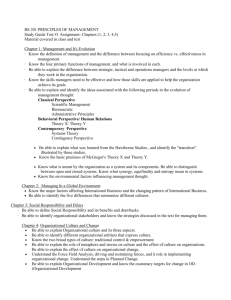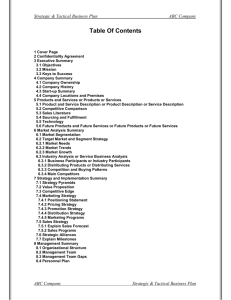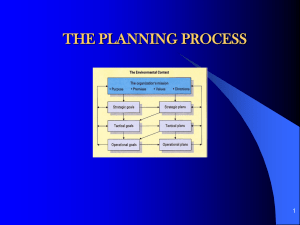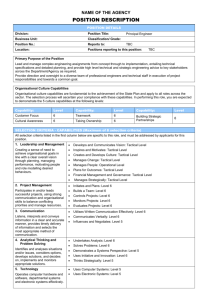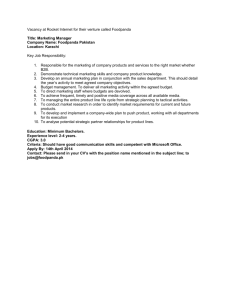Marketing Planning 1 – Planning The Way Ahead
advertisement
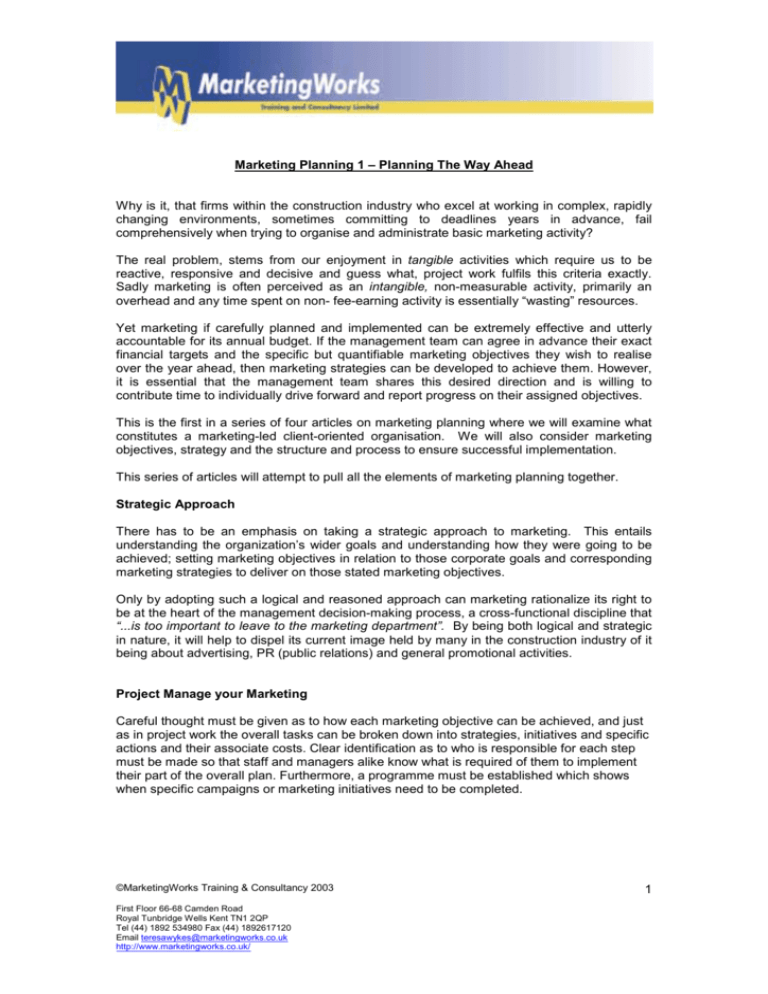
Marketing Planning 1 – Planning The Way Ahead Why is it, that firms within the construction industry who excel at working in complex, rapidly changing environments, sometimes committing to deadlines years in advance, fail comprehensively when trying to organise and administrate basic marketing activity? The real problem, stems from our enjoyment in tangible activities which require us to be reactive, responsive and decisive and guess what, project work fulfils this criteria exactly. Sadly marketing is often perceived as an intangible, non-measurable activity, primarily an overhead and any time spent on non- fee-earning activity is essentially “wasting” resources. Yet marketing if carefully planned and implemented can be extremely effective and utterly accountable for its annual budget. If the management team can agree in advance their exact financial targets and the specific but quantifiable marketing objectives they wish to realise over the year ahead, then marketing strategies can be developed to achieve them. However, it is essential that the management team shares this desired direction and is willing to contribute time to individually drive forward and report progress on their assigned objectives. This is the first in a series of four articles on marketing planning where we will examine what constitutes a marketing-led client-oriented organisation. We will also consider marketing objectives, strategy and the structure and process to ensure successful implementation. This series of articles will attempt to pull all the elements of marketing planning together. Strategic Approach There has to be an emphasis on taking a strategic approach to marketing. This entails understanding the organization’s wider goals and understanding how they were going to be achieved; setting marketing objectives in relation to those corporate goals and corresponding marketing strategies to deliver on those stated marketing objectives. Only by adopting such a logical and reasoned approach can marketing rationalize its right to be at the heart of the management decision-making process, a cross-functional discipline that “...is too important to leave to the marketing department”. By being both logical and strategic in nature, it will help to dispel its current image held by many in the construction industry of it being about advertising, PR (public relations) and general promotional activities. Project Manage your Marketing Careful thought must be given as to how each marketing objective can be achieved, and just as in project work the overall tasks can be broken down into strategies, initiatives and specific actions and their associate costs. Clear identification as to who is responsible for each step must be made so that staff and managers alike know what is required of them to implement their part of the overall plan. Furthermore, a programme must be established which shows when specific campaigns or marketing initiatives need to be completed. ©MarketingWorks Training & Consultancy 2003 First Floor 66-68 Camden Road Royal Tunbridge Wells Kent TN1 2QP Tel (44) 1892 534980 Fax (44) 1892617120 Email teresawykes@marketingworks.co.uk http://www.marketingworks.co.uk/ 1 Outline Steps for Marketing Planning 1. 2. 3. 4. 5. 6. 7. 8. Analyse the changing business environment Identify the options relevant to the firm’s core competences Establish firm business strategy and define marketing objectives Set marketing strategies and performance targets Confirm achievable by undertaking market and client research Formulate tactical initiatives and action Seek individuals’ commitment to implementing their part of plan Create monitoring controls to evaluate performance The process described above is project management - marketing style, a generic management tool that has proved to work rather well in the construction industry over the last fifteen years. So if your board is convinced project management has helped improve the control and efficiency of project administration, it will not take much to get them thinking of what it could do for their marketing activities. Let’s start with the basics: What is a marketing plan? • • • • It is a formal management process All marketing resources are allocated to meet specified marketing objectives. The marketing plan should knit together the strategic cornerstones of the corporate / business plan It is a standard against which day-to-day marketing decisions are made. In being able to “knit together” both strategic and tactical elements, the marketing plan should correspondingly include both strategic and tactical aspects. For purposes of implementing the marketing plan: • • • • The strategic and tactical elements can be differentiated by time frame. Any planning process needs to take account of both the long and short term. The broad three year marketing plan should be treated as the strategic plan The first year as the tactical short-term plan. One of the first things to say about marketing plans is that they: • • Should be a focus for the whole business unit and / or firm and should not therefore be restricted to the marketing department. Secondly they should be based on the market(s) in which the business unit is operating. This is a simple but important point. Marketing plans should take account of budgets and other financial measures but should not be based on them. Similarly sales-led organizations may base their planning and budgeting around sales targets. These might be overly optimistic to motivate a sales force rather than a realistic assessment of what the market will bear. ©MarketingWorks Training & Consultancy 2003 First Floor 66-68 Camden Road Royal Tunbridge Wells Kent TN1 2QP Tel (44) 1892 534980 Fax (44) 1892617120 Email teresawykes@marketingworks.co.uk http://www.marketingworks.co.uk/ 2 Marketing plans and budgets, should necessarily: • be founded on careful, realistic assessments of what the market is doing in terms of both its external environment e.g. economic conditions, market sector growth versus saturation / stagnation, competitor activity etc. • what the firm can do in response to those external factors e.g. new service launches, service extensions or improvements, improvements through new distribution (new offices, new locations) , better promotion (hospitality, mailshots, campaigns etc.) increased sales force (often not required as easier and cheaper to get existing staff to take on a small degree of marketing responsibility). • Numbers and quantifiable targets (actually measurable and not just wish statements) are a central aspect of any professional and comprehensive marketing plan. • Targets must be tangible and realisable so as to not de-motivate. However the use of numbers, financial or by volume is not enough on its own. Soft factors that require written explanation are similarly just as much a prerequisite as the quantifiable elements. The approach to marketing planning: • • • • Not only a formalised system One that complements the wider corporate aims and strategies of the organization as a whole. To that end marketing planning is at the heart of the firm and its planning and is accordingly cross-functional. It is not simply a tactical description of how marketing resources will be allocated over the forthcoming twelve-month budgeting period. It follows on from this that if a marketing plan is founded on solid, factual information about the market place itself, then the starting point for constructing the plan will be the search for data organized in such a way as to become useful information. This information gathering process is called the marketing audit which we shall cover next month. Recommended reading Any delegate interested in reading more on marketing audits and planning are strongly recommended to refer to Marketing Plans, Malcolm H.B. McDonald, Heinemann Professional Publishing, 1990, on which this seminar was broadly based. Bibliography McDonald, Malcolm H.B., (1990) “Marketing Plans,” Heinemann Professional Publishing, ©MarketingWorks Training & Consultancy 2003 First Floor 66-68 Camden Road Royal Tunbridge Wells Kent TN1 2QP Tel (44) 1892 534980 Fax (44) 1892617120 Email teresawykes@marketingworks.co.uk http://www.marketingworks.co.uk/ 3
